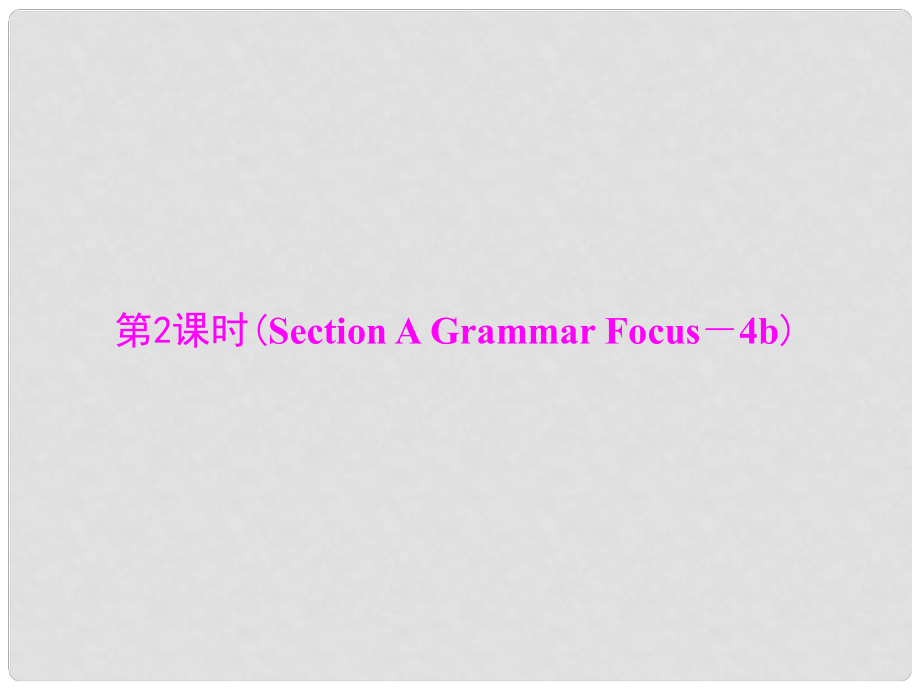《九年級(jí)英語(yǔ)全冊(cè) Unit 14 I remember meeting all of you in Grade 7 第2課時(shí)(Section A Grammar Focus-4b)課件 (新版)人教新目標(biāo)版》由會(huì)員分享����,可在線閱讀,更多相關(guān)《九年級(jí)英語(yǔ)全冊(cè) Unit 14 I remember meeting all of you in Grade 7 第2課時(shí)(Section A Grammar Focus-4b)課件 (新版)人教新目標(biāo)版(14頁(yè)珍藏版)》請(qǐng)?jiān)谘b配圖網(wǎng)上搜索�。
1、第2課時(shí)(Section A Grammar Focus4b)短 語(yǔ)have problems with sth.點(diǎn)撥have problems with sth.意為“在方面有困難”���,與 have difficulty in sth.意思相同�����。 如:I had problems with math last term, but I am good at it now.上學(xué)期我在數(shù)學(xué)方面有困難��,但是現(xiàn)在我擅長(zhǎng)數(shù)學(xué)�����。鏈接表示“做有困難”還有如下同義詞組:have trouble (in) doinghave difficulty (in)doinghave problems in doingha
2��、ve a hard/difficult time (in) doing語(yǔ) 法1定語(yǔ)從句點(diǎn)撥(1)定義在復(fù)合句中�����,修飾某一名詞或代詞的從句叫定語(yǔ)從句���。被定語(yǔ)從句修飾的詞叫先行詞����;引導(dǎo)定語(yǔ)從句的詞叫關(guān)系詞。如:I love singers who write their own music.我喜歡自己寫(xiě)音樂(lè)的歌手���。I like music that I can dance to.我喜歡可以跟著跳舞的音樂(lè)�����。(2)用法若先行詞是人��,且在從句中做主語(yǔ)���,關(guān)系詞用 who 或 that;做賓語(yǔ)時(shí),可用 whom 或 that����,且常可省略���。若先行詞為物�,且在從句中做主語(yǔ)或賓語(yǔ)��,關(guān)系詞用 which 或 tha
3����、t;做賓語(yǔ)時(shí)可省略���。whose 既可指人又可指物����,在從句中做定語(yǔ)����。(3)只能用 that,不能用 who 或 which 引導(dǎo)定語(yǔ)從句的情況當(dāng)先行詞為 none, little, all, much, everything, anything 等不定代詞��,或先行詞被不定代詞修飾時(shí)。如:Is there anything else that you require����?你還需要一些其他的什么東西嗎?當(dāng)先行詞被序數(shù)詞或形容詞最高級(jí)修飾時(shí)��。如:This is the best novel that I have ever read.這是我讀過(guò)的最好的小說(shuō)�����。當(dāng)先行詞被 the same, the last
4����、, the only, the right, the very等詞修飾時(shí)。如:This is the very film that we enjoy.這正是我們所喜歡的那部電影�。當(dāng)先行詞既有人又有物時(shí)��。如:The foreign visitors spoke highly of the pioneers and theirperformances that they saw at the Childrens Palace.外國(guó)游客高度贊揚(yáng)了他們?cè)谏倌陮m所看到的少先隊(duì)員以及他們的表演��。注意:關(guān)系代詞做從句的主語(yǔ)時(shí)���,從句的謂語(yǔ)動(dòng)詞要跟先行詞保持?jǐn)?shù)的一致��。2一般將來(lái)時(shí)點(diǎn)撥(1)定義表示將來(lái)某個(gè)時(shí)間要
5���、發(fā)生的動(dòng)作或存在的狀態(tài)���,也表示將來(lái)經(jīng)常或反復(fù)發(fā)生的動(dòng)作���,常與表示將來(lái)的時(shí)間狀語(yǔ)連用��。如tomorrow, soon, next Monday, next year, next weekend, thisafternoon, this evening 等���。(2)一般將來(lái)時(shí)常用的兩種結(jié)構(gòu)be going to動(dòng)詞原形: 表示打算、準(zhǔn)備做的事或即將發(fā)生或肯定要發(fā)生的事����。如:My sister is going to learn English next year.我姐姐準(zhǔn)備明年學(xué)英語(yǔ)。shall/will動(dòng)詞原形:表示將要發(fā)生的動(dòng)作或情況���,沒(méi)有太多的計(jì)劃性�����, 還用來(lái)表示意愿����。如:Shall we v
6、isit Granny Li next week �?下周我們?nèi)グ菰L李奶奶好嗎?3一般現(xiàn)在時(shí)點(diǎn)撥(1)定義一般現(xiàn)在時(shí)表示經(jīng)常����、習(xí)慣性的動(dòng)作或者存在的狀態(tài)。(2)一般現(xiàn)在時(shí)的兩種構(gòu)成形式Be 型:句子的謂語(yǔ)動(dòng)詞是 be (am�����,is, are)���。 如:Im a teacher, and she is a lawyer.我是個(gè)老師����,她是個(gè)律師�����。實(shí)義動(dòng)詞型:句中的謂語(yǔ)動(dòng)詞用動(dòng)詞原形表示����,若主語(yǔ)是第三人稱單數(shù)��,則用動(dòng)詞的第三人稱單數(shù)形式。如:My sister likes sports very much.我妹妹非常喜歡運(yùn)動(dòng)��。(3)用法常與表示頻率的時(shí)間狀語(yǔ)連用�����,如 always, usually, o
7�����、ften,sometimes等��;當(dāng)然���,還有every 一族,如every day, every morning,every Sunday 等����。除此之外,還有 on Sundays, on Mondays 等等�。陳述當(dāng)前的一個(gè)事實(shí)。如:My mother is a doctor.我媽媽是一名醫(yī)生���。表示客觀事實(shí)���、普遍的真理。如:The earth is smaller than the sun.地球比太陽(yáng)小��。表示一種自然現(xiàn)象��。如:Days are long in summer.在夏天,白天很長(zhǎng)���。4般過(guò)去時(shí)點(diǎn)撥(1)定義一般過(guò)去時(shí)表示過(guò)去經(jīng)?���;蚺既话l(fā)生的動(dòng)作或存在的狀態(tài)。(2)一般過(guò)去時(shí)的兩種構(gòu)成形
8�����、式Be 型肯定句:主語(yǔ)was/were表語(yǔ)��。如:I was late yesterday.昨天我遲到了��。否定句:主語(yǔ)was/werenot表語(yǔ)�����。如:We werent late yesterday.我們昨天沒(méi)遲到����。一般疑問(wèn)句:Was/Were主語(yǔ)表語(yǔ)�����。如:Were you ill yesterday����?你昨天病了嗎?肯定回答: Yes, I was.是的���,我病了�����。否定回答: No, I wasnt.不���,我沒(méi)病。特殊疑問(wèn)句: 特殊疑問(wèn)詞was/were主語(yǔ)表語(yǔ)。如:When were you born����?你是什么時(shí)候出生的?實(shí)義動(dòng)詞型肯定句:主語(yǔ)動(dòng)詞過(guò)去式(賓語(yǔ))其他���。如:I went home a
9�、t nine oclock yesterday.我昨天九點(diǎn)鐘回的家�����。否定句:主語(yǔ)didnt 動(dòng)詞原形(賓語(yǔ))其他�。如:I didnt go home yesterday.我昨天沒(méi)回家。疑問(wèn)句:Did 主語(yǔ)動(dòng)詞原形(賓語(yǔ))其他�。如:Did you go home yesterday?你昨天回家了嗎��?肯定回答:Yes, I did.是的����,我回了。否定回答:No, I didnt.不�,我沒(méi)回家。特殊疑問(wèn)句:特殊疑問(wèn)句did主語(yǔ)動(dòng)詞原形(賓語(yǔ))其他����。如:What did you do last night�?昨晚你做了什么�?(3)一般過(guò)去時(shí)的時(shí)間狀語(yǔ)一般過(guò)去時(shí)常與 yesterday, last week, last month, last year,two months ago, the day before yesterday, in 1990, in those days等表示過(guò)去的時(shí)間狀語(yǔ)連用�。如:I was born in 1990.我出生在 1990 年。When did you go to the park�?你是什么時(shí)候去的公園?
 九年級(jí)英語(yǔ)全冊(cè) Unit 14 I remember meeting all of you in Grade 7 第2課時(shí)(Section A Grammar Focus-4b)課件 (新版)人教新目標(biāo)版
九年級(jí)英語(yǔ)全冊(cè) Unit 14 I remember meeting all of you in Grade 7 第2課時(shí)(Section A Grammar Focus-4b)課件 (新版)人教新目標(biāo)版

